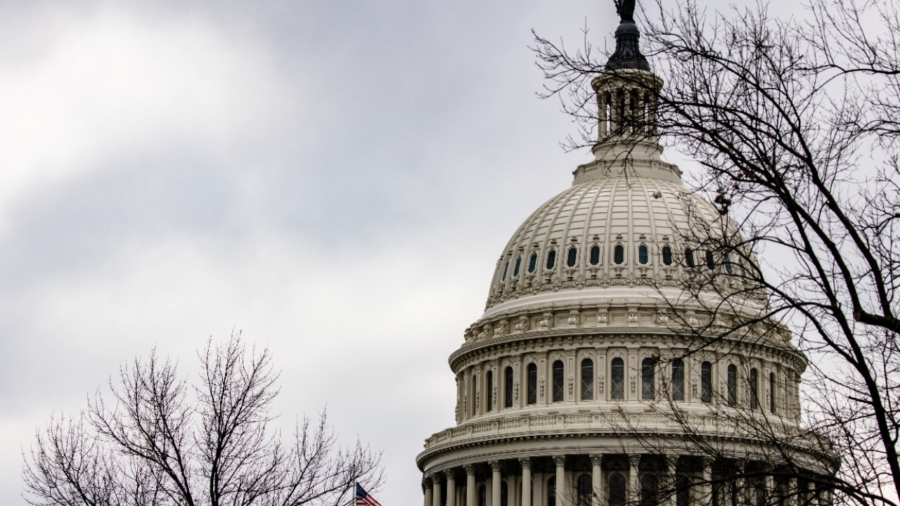Democrats pushed their H.R. 1 “For the People Act” to the House floor on March 2, while allowing consideration of only a handful of Republican amendments and after only a single perfunctory committee hearing.
The massive proposal of nearly 800 pages would make federal laws out of many of the most controversial 2020 presidential election voter registration and voting procedures—measures that were originally implemented by state officials in response to the CCP (Chinese Communist Party) virus pandemic and national lockdown. The virus is also known as the novel coronavirus.
The House debated the bill most of the morning, then began consideration of 56 amendments allowed to be brought to the floor for votes. Only seven of the amendments were authored by Republicans. A vote on final passage is expected Wednesday.
Among the most hotly contested provisions of H.R.1 are those providing universal national mail-in balloting, registration of 16- and 17-year-olds, permanent early voting, minimal verification for online registration, legalization of ballot harvesting, federal matching funds to candidates for private contributions, and voting rights for felons upon completion of their sentences.
But the proposal also contains major changes in a multitude of arenas of American governance, including such constitutional issues as bureaucratic regulation of who can say what and when about a candidate for federal office. The Federal Election Commission (FEC) would be converted to a partisan-majority-rules entity rather than the present structure that requires bipartisan support for regulations.
The proposal also allows federal candidates to draw salaries from campaign funds contributed by individuals and special interests concerned about proposals before Congress, a form of compensation that has never previously been legal.
The proposal also transfers from the states the authority to determine their congressional districts to new independent commissions to be made up of academics, public officials and private citizens.
During the morning general debate on the bill, House Administration Committee Zoe Lofgren (D-Calif.), who managed presentations by supporters, said “the last election, conducted during a once-in-a-generation pandemic saw changes that made it easier for many Americans to vote. Reforms like absentee voting and early voting. It also put into stark focus what many of us already knew, deep inequities persist in our democratic system.”
Lofgren claimed the 2020 election had “a record turnout with no credible instance of election irregularity,” and “we should protect access to the ballot, not restrict it.”
Rep. Rodney Davis (R-Ill.), the ranking Republican on the administration committee and manager of the opposition presentations, told the House during the morning debate that “the bill is nearly 800 pages of provisions that take away election decisions from state and local and puts them in the hands of the federal government.
“It attacks Americans’ First Amendment rights to free speech and it publicly funds members of Congress campaigns using corporate dollars … H.R. 1 would launder corporate dollars through the U.S. Treasury and use those dollars to publicly fund congressional campaigns.
“I know when I speak with my constituents back home, establishing a program that helps me acquire more money for my campaign is not what they think the federal government should be working on.”
Rep. Debbie Lesko (R-Ariz.) described the bill as “not for the people, it’s for the politicians. The bill weaponizes the Federal Election Commission, infringes on states’ rights, and drastically limits freedom of speech.”
At one point during the proceedings, Rep. Chip Roy (R-Texas) asked “why don’t we have a debate here on the problems and potential concerns with mail-in ballots that is part of a non-partisan concern, why do we not have the debate robustly here on the floor for the American people to see?”
House Majority Leader Steny Hoyer (D-Md.) responded, saying “that’s a legitimate debate to have and I think we’ve been having that debate and very frankly, I tell my friend from Texas, I think we’ve won that debate. We’ve won it in the courts over and over and over again.”
Late last week, Lofgren’s panel, which has jurisdiction over federal election oversight authority, held a Feb. 25 hearing on H.R. 1 that Republicans described as much less than should be devoted to a legislative proposal of such magnitude.
Davis told the hearing that he and his two GOP colleagues on the panel “have submitted a total of 25 amendments here today. We’ve submitted these amendments because the majority decided not to go through regular order and deny the minority and many Americans a voice in this legislation.
“Not only did this bill not go through a markup, but our committee only held one hearing on this nearly 800-page bill. The hearing was four days ago. During the hearing, the Minority’s witness was the only person on the panel who has actually administered an election. He testified that H.R. 1 would not only be difficult for many states to implement but it would undermine many policies states are putting in place to improve the election process for the unique needs of their voters.”
The House is expected to continue debating the 56 amendments for the rest of the day.
From The Epoch Times

